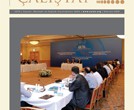President Abdullah Gül said it’s a “historic opportunity” and called on everyone not to miss it. Prime Minister Erdoğan said “good things may happen.” Interior Minister Beşir Atalay confirmed that “some steps are being taken.” A few weeks earlier, the chief of general staff, İlker Başbuğ, outlined the military’s vision on the problem and gave the most progressive speech by any top general.
Everybody is talking about the Kurdish issue again in Turkey — and it is not only civilians and the military. Last week, Hasan Cemal of the Milliyet daily conducted a major interview with the Kurdistan Workers’ Party’s (PKK) number one man, Murat Karayılan. Karayılan outlined the PKK’s view on the Kurdish issue and made a similar call for a national reconciliation. To my surprise, Karayılan’s remarks were often confused and convoluted and said very little about the practical steps to be taken. I am surprised because you would expect the leader of an organization such as the PKK to have a clear idea as to what they want. It looks like the PKK’s top commander is more concerned about saving the PKK than developing new and fresh ideas about the Kurdish issue. Abdullah Öcalan is still the most powerful man controlling the PKK. But is he the only important actor in the Kurdish issue? I think not. The reason is that Öcalan’s hold on the PKK does not give him a monopoly over the Kurdish issue. True, the PKK has been a key player in the issue because it had the guns, the sympathy of the Kurds and the support of some foreign countries. On all three fronts, things are changing. By their own admission, the PKK fighters do not have the military capability they used to have. The support of the Kurds for the PKK has been dwindling, not because the Kurdish issue has been resolved, but because the PKK has failed to deliver on many fronts. And finally, the international view on the PKK and the Kurdish issue is changing. Europeans and Americans, who used to pressure Turkey on the Kurdish issue, need to have a strong Turkey for their own strategic interests, and this means helping rather than pressuring Turkey.
But the most important change taking place, albeit slowly, is within the Turkish state itself. There is a growing consensus among civilians and the military on two key issues: the urgency of the matter and the fact that it cannot be solved by military means alone. This means making a clear distinction between terrorism and the Kurdish issue, and separating the PKK from the legitimate and democratic demands of Kurds in Turkey .
The Turkish state has come this far, and, given its history, this is major progress. Turkish officials seem ready to take new steps to grant the Kurdish citizens of Turkey more cultural rights. These include returning the names of Kurdish villages that have been changed to modern Turkish, allowing the Kurdish language to be taught in high schools, opening up institutes for the study of Kurdish language and culture and giving greater freedom to Kurdish media.
But is this enough? No. Unless the Turkish state finds a way to deal with the PKK as a national issue, the armed struggle will find new grounds.
President Gül is right to call this turn of events a historic opportunity. But the onus of turning this into an effective process of national reconciliation also falls on his shoulders. The president should immediately convene the political parties in Parliament to create a political consensus. He should then get the army on his side on the key issues. Finally, he should include civilian actors — NGOs, experts, scholars and journalists — to come up with a blueprint which will represent the widest possible consensus on the issue. Once this is achieved, the PKK, regardless of its unreasonable and selfish demands, will have to respond positively or lose its political legitimacy once and for all.
Today’s Zaman – May 14, 2009
In this article
- Domestic Policy
- 2009
- Europe
- Global Actors | Local Actors
- historic
- IS
- Kurdish Community
- Kurdish Question
- Kurdistan Workers' Party Terrorist Organization (PKK)
- PKK - YPG - SDF - PYD - YPJ - SDG - HBDH - HPG - KCK - PJAK - TAK - YBŞ
- Prime Minister
- Recep Tayyip Erdoğan
- SETA
- Terror
- Terrorism
- The
- The President of the Republic of Türkiye
- Turkish Foreign Policy
- Turkish President
- Turkish-American Relations
- Türkiye-US Relations
- What

